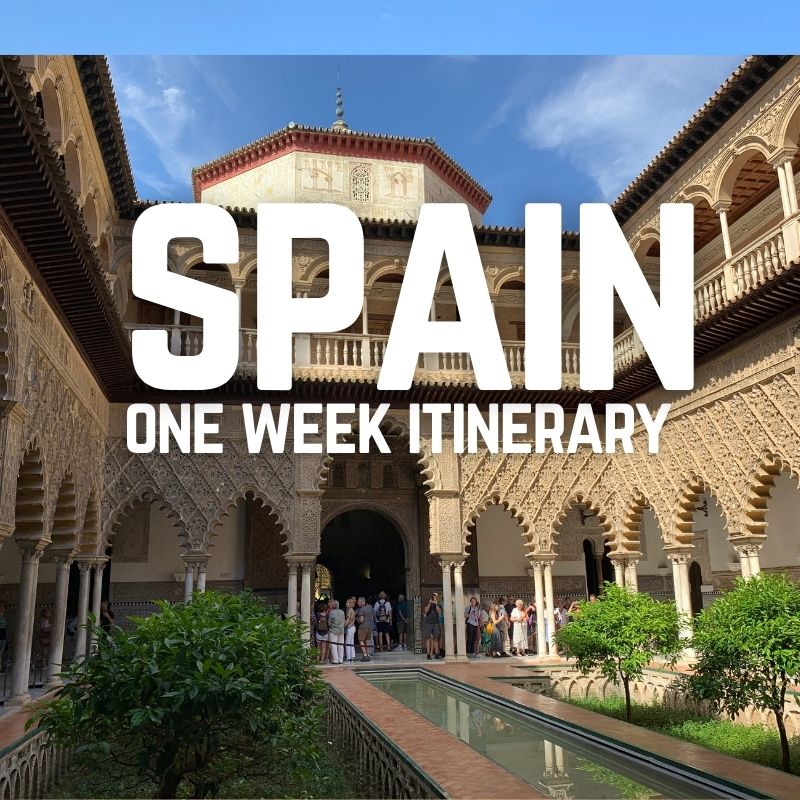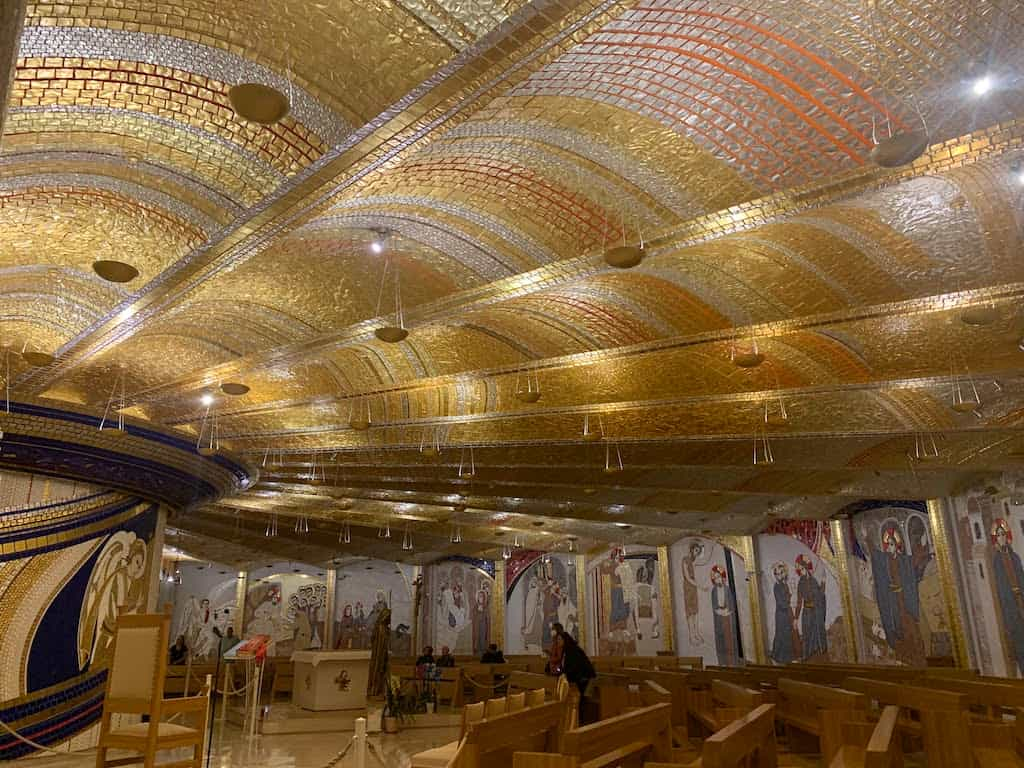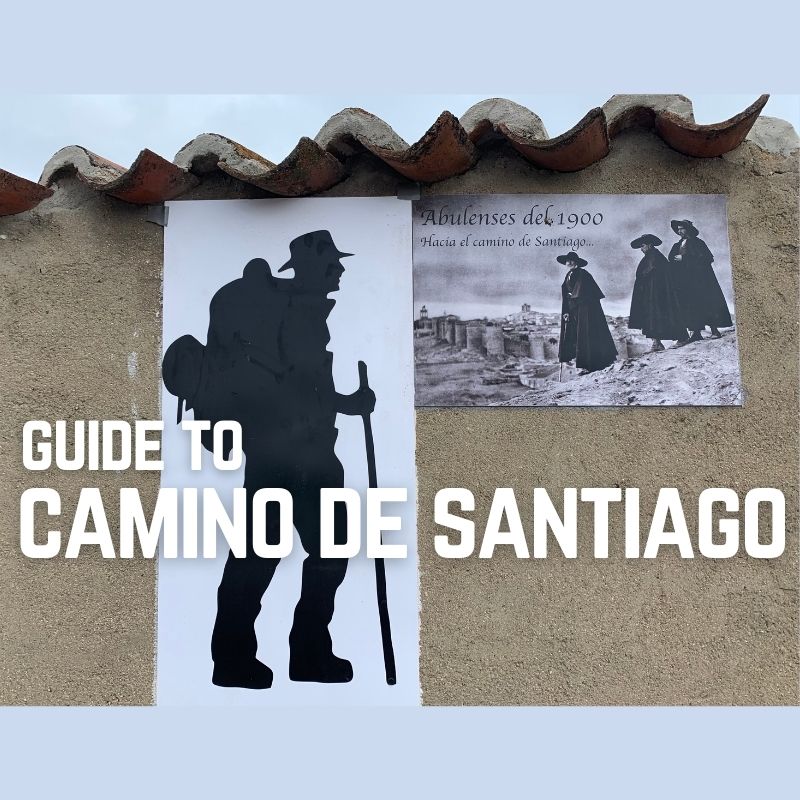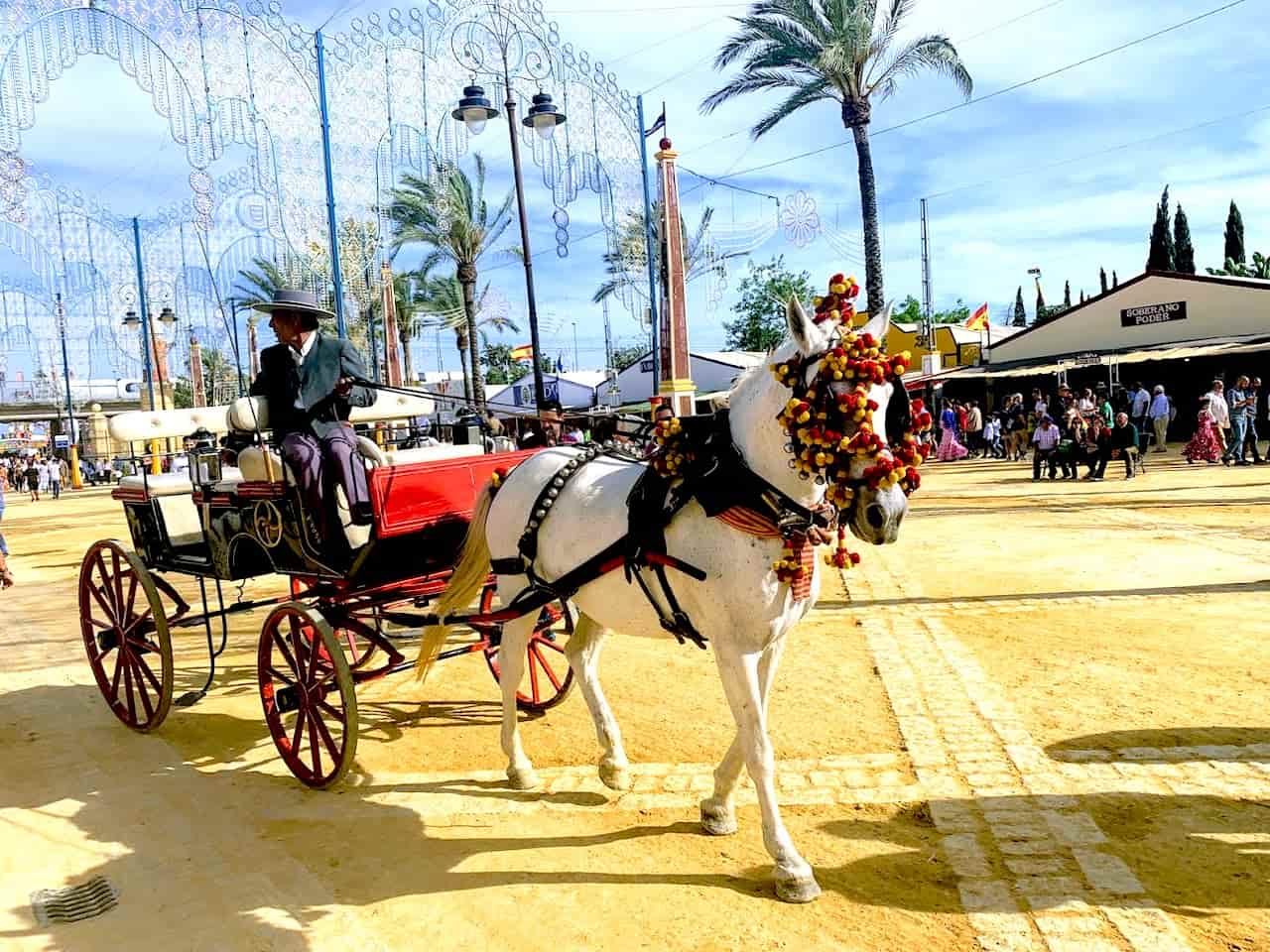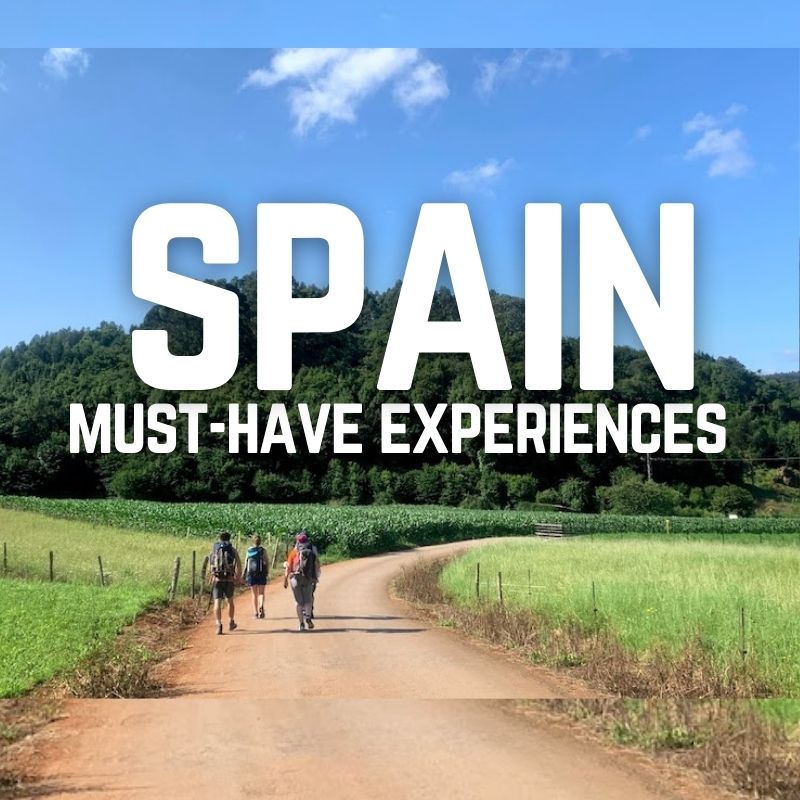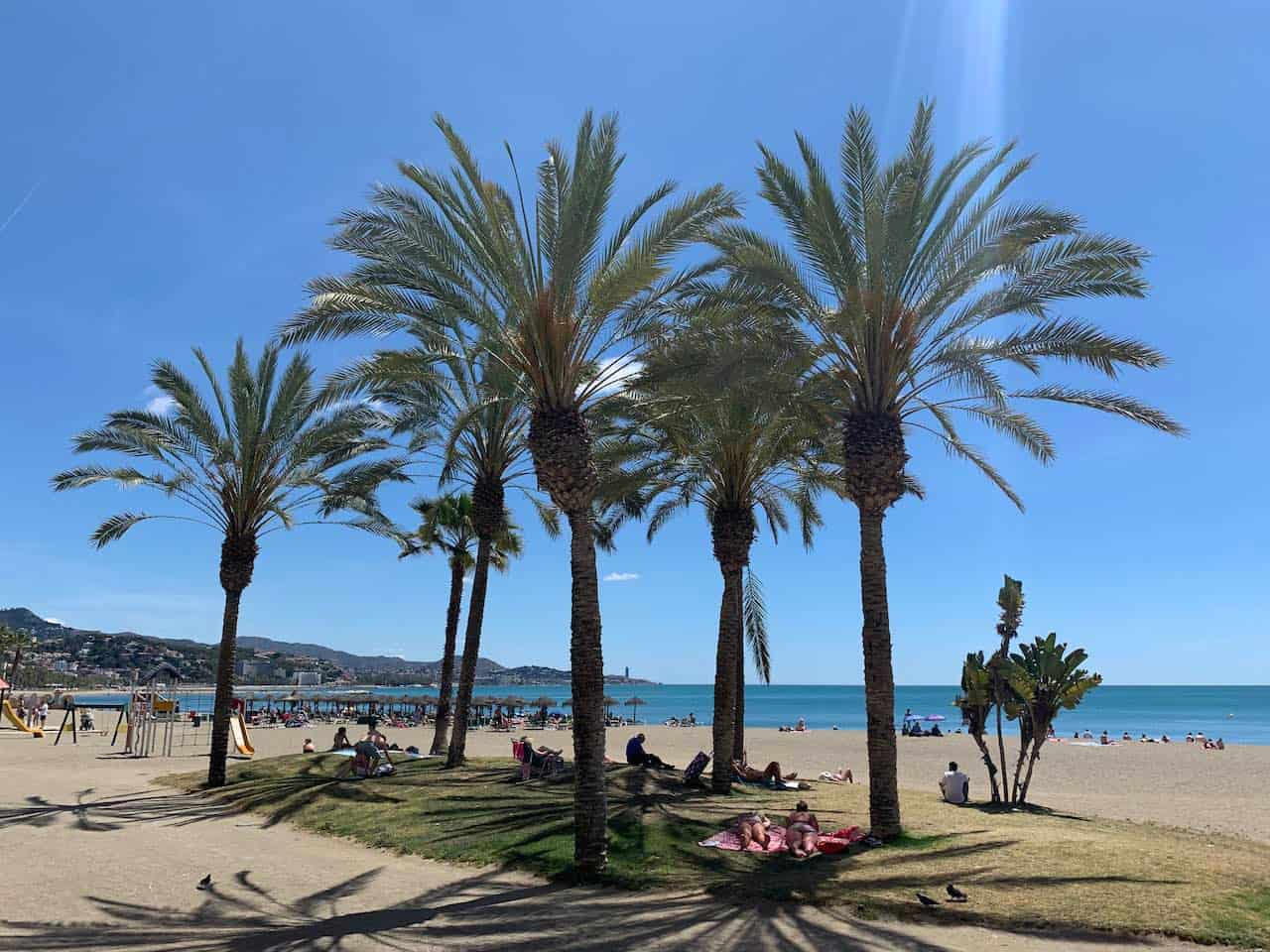Interested in hiking Camino de Santiago a Finisterre? Been there, done that. And here is my complete guide to Camino de Santiago a Finisterre.
In June 2022 I hiked Via de la Plata from Salamanca to Santiago de Compostela in Spain.
It was my second Camino de Santiago, after hiking Camino del Norte in the summer of 2021.
After reaching Santiago de Compostela on my second Camino de Santiago, I decided to walk from Santiago de Compostela to Finisterre and to reach ‘the End of the World’. I decided to hike Camino de Santiago a Finisterre (Camino de Santiago a Fisterra).
THIS POST MAY CONTAIN COMPENSATED LINKS. PLEASE READ MY DISCLAIMER FOR MORE INFO.
- CAMINO DE SANTIAGO A FINISTERRE GUIDE
- WHAT IS CAMINO DE SANTIAGO A FINISTERRE
- FROM WHERE TO WHERE DOES CAMINO DE SANTIAGO A FISTERRA GO?
- HOW LONG IS CAMINO DE SANTIAGO A FINISTERRE?
- HOW MANY DAYS DOES IT TAKE TO HIKE CAMINO DE SANTIAGO A FINISTERRE
- HOW IS CAMINO DE SANTIAGO A FISTERRA MARKED
- CAMINO DE SANTIAGO A FINISTERRE STAGES
- CAMINO DE SANTIAGO A FISTERRA: ITINERARY AND HIGHLIGHTS
- CAMINO DE SANTIAGO A FINISTERRE ALBERGUES
- WHERE TO GET CAMINO DE SANTIAGO A FINISTERRE CREDENTIAL
- HOW IS CALLED THE CERTIFICATE OF CAMINO A FINISTERRE
- WHERE TO GET FISTERRANA
- WHAT IS THE BEST TIME TO DO CAMINO FINISTERRE
- CAMINO FINISTERRE MAP
- WHAT TO PACK FOR CAMINO DE FISTERRA
- VISITING FISTERRA BY A DAY TOUR OR BY BUS
CAMINO DE SANTIAGO A FINISTERRE GUIDE
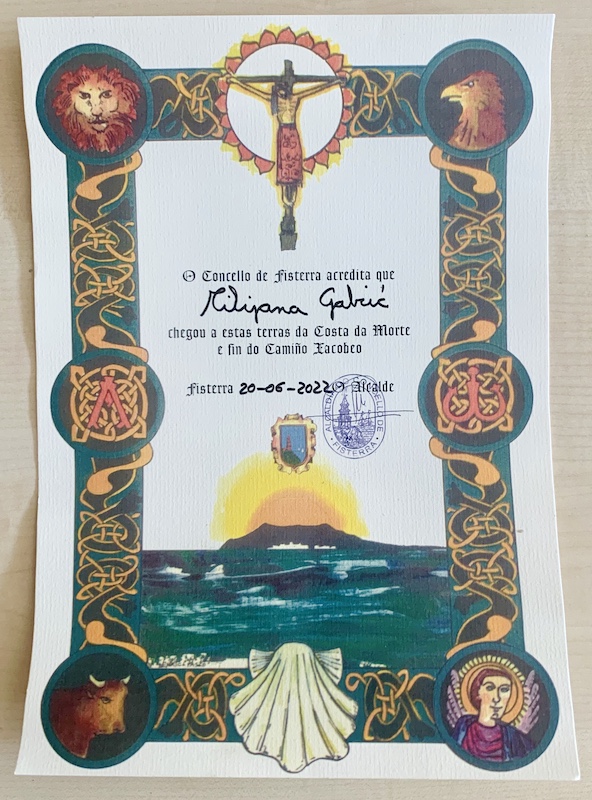
Camino Santiago a Finisterre
Camino de Santiago a Finisterra (also called Camino de Santiago a Fisterra) is the final leg of the famous Camino de Santiago (St James Way) that starts in Santiago de Compostela in Galicia and finishes in Finisterre (Fisterra) on the Atlantic coast in Galicia.
Camino de Santiago a Finisterre is the culmination of the Camino de Santiago pilgrimage journey.
According to Santiago de Compostela Pilgrim’s Reception Office, only 1 % of pilgrims who hike Camino de Santiago decide to hike this final leg and reach ‘the End of the World’ at Finisterre Lighthouse on the Cape Finisterre peninsula on the Atlantic coast in Galicia.
WHAT IS CAMINO DE SANTIAGO A FINISTERRE
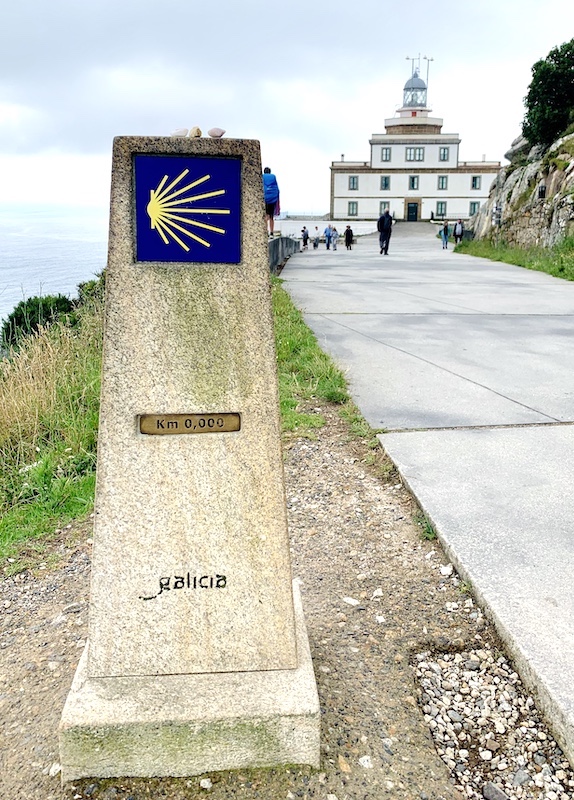
Camino de Santiago a Finisterre is the historical end of the Camino de Santiago pilgrimage route in Spain. It is the final stretch of the Camino de Santiago.
Camino de Santiago a Fisterra is the only Camino that starts in Santiago de Compostela.
Camino de Santiago a Fisterra goes from Santiago de Compostela to Finisterre on the Atlantic coast in Spain.
Finisterre in Spanish (or, Fisterra in the Galician dialect) is a small fishing port town on the Cape Finisterre peninsula on the rugged Atlantic coast of Galicia in Spain.
(Just to mention, if you want to try some of the freshest best seafood in Spain – barnacles, octopus, scallops…, Fisterra in Galicia is a place to do it).
Finisterre (Fisterra) was believed to be the ‘End of the World’ in Roman times. The name Finisterre comes from the Latin Finis Terrae which means ‘End of the Earth‘. Finisterre was believed to be the most western point of the Roman empire and the place where the world (before the discovery of the Americas).
In medieval times, after visiting the tomb of St James in the Cathedral of Santiago de Compostela, pilgrims continued their pilgrimage to Finisterre to meet the end of the world.
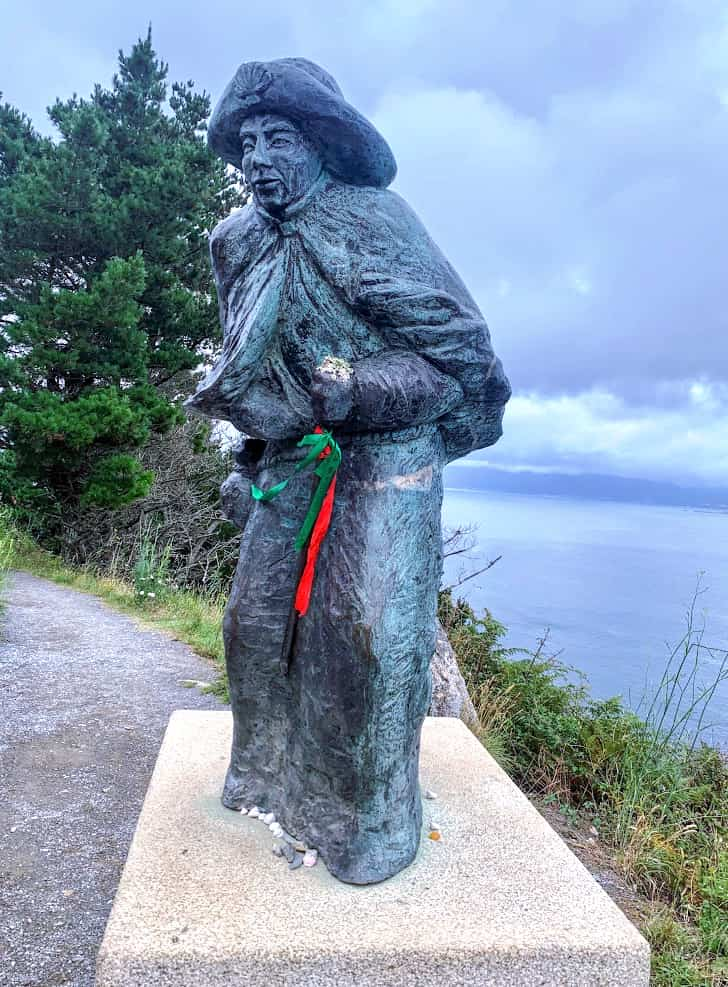
However, the tradition of journeying to the ‘End of the World’ has been existing for over 5.000 years. In pre-Roman and pre-Christian times, Cape Fisterra on the Costa da Morte (Coast of Death) was believed to be the place where the sun dies (by disappearing into the ocean) and the place where the world of dead and the world of the living meet.
Today, Fisterra symbolizes the End of the Way (the End of Camino). Watching the sunset at Finsterra Lighthouse is one of the most popular ways to celebrate the end of the Camino.
For many Camino pilgrims, the sunset at the ‘End of the World’ symbolizes the ‘End of the Journey’.
Cabo Fisterra is a place of pilgrims’ farewells. The Pilgrim’s Boot sculpture next to Fisterra Lighthouse honors the pilgrims who finished the Camino Fisterra.
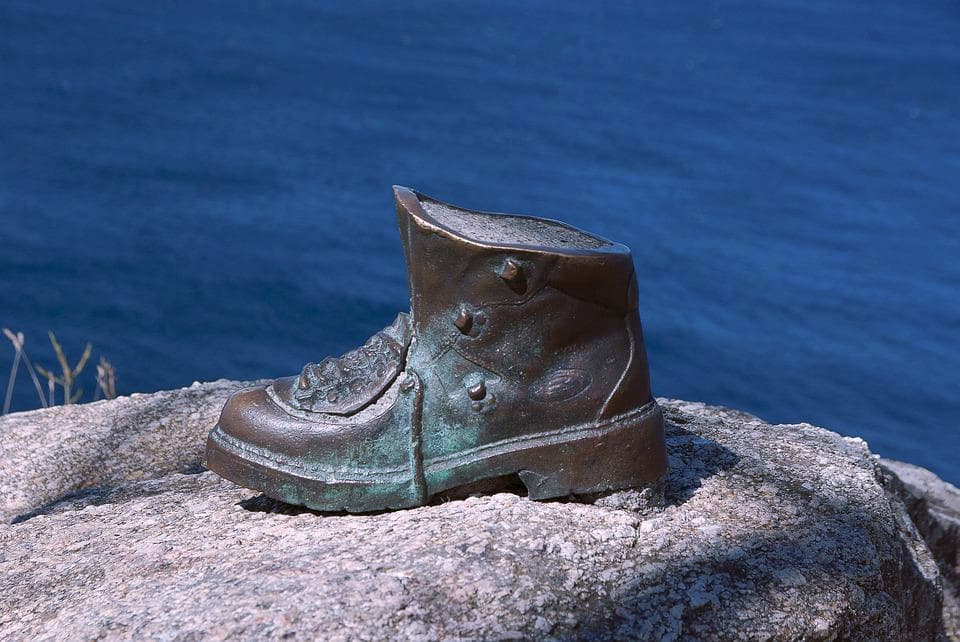
FROM WHERE TO WHERE DOES CAMINO DE SANTIAGO A FISTERRA GO?
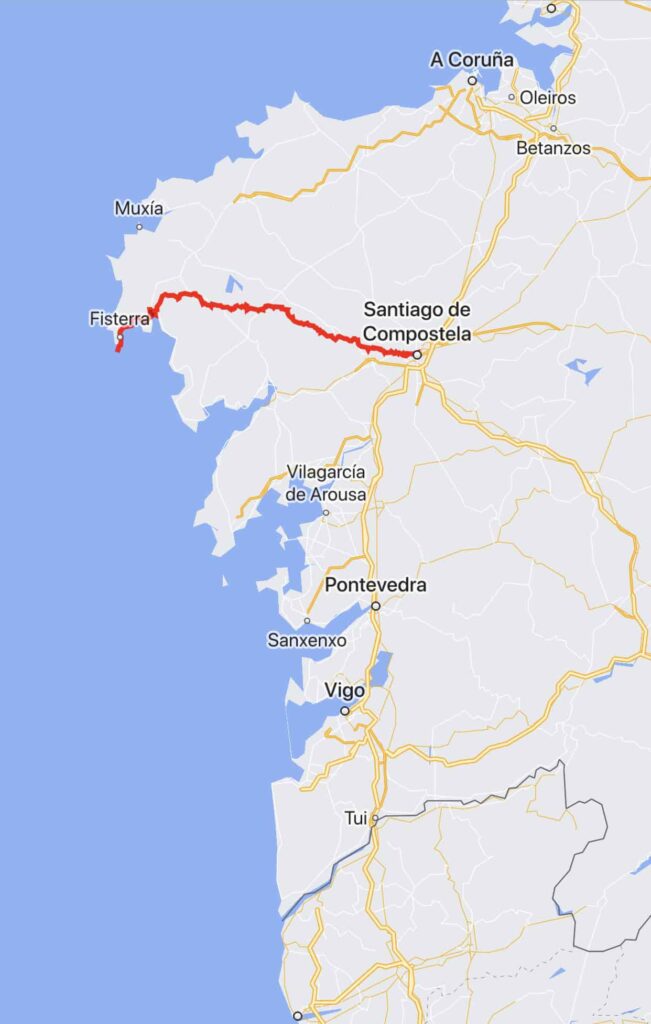
Camino de Santiago a Fisterra goes from Santiago de Compostela to Fisterra on the Costa da Morte (Coast of Death) on the Atlantic Coast in Galicia in Spain.
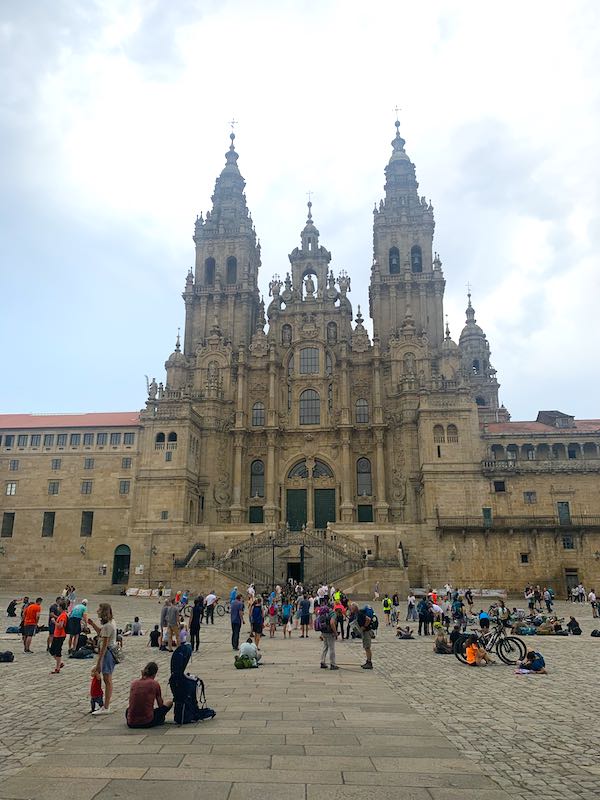
Camino de Santiago a Fisterra officially starts from the Obradoiro Square (Praza do Obradoiro) and the Cathedral of Santiago de Compostela and finishes at the Cape Finisterre Lighthouse (Faro de Finisterre).
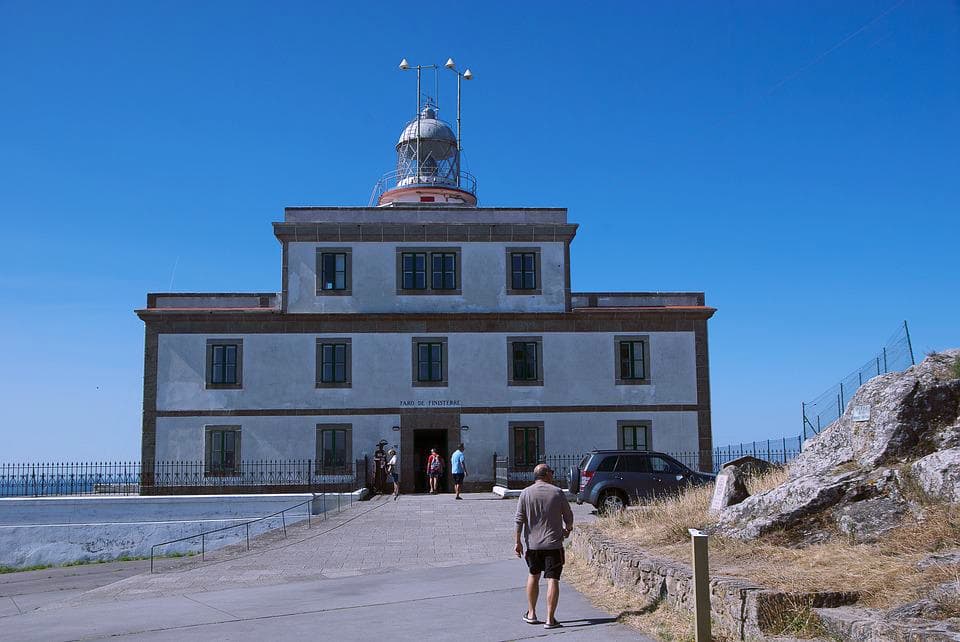
HOW LONG IS CAMINO DE SANTIAGO A FINISTERRE?
Santiago to Finisterre distance
Camino de Santiago a Fisterra is a 55 mi (90 km) long trail from Santiago de Compostela to Fisterra.
HOW MANY DAYS DOES IT TAKE TO HIKE CAMINO DE SANTIAGO A FINISTERRE
It takes 3 or 4 days to walk Camino Santiago a Finisterre from Santiago to Finisterra.
HOW IS CAMINO DE SANTIAGO A FISTERRA MARKED
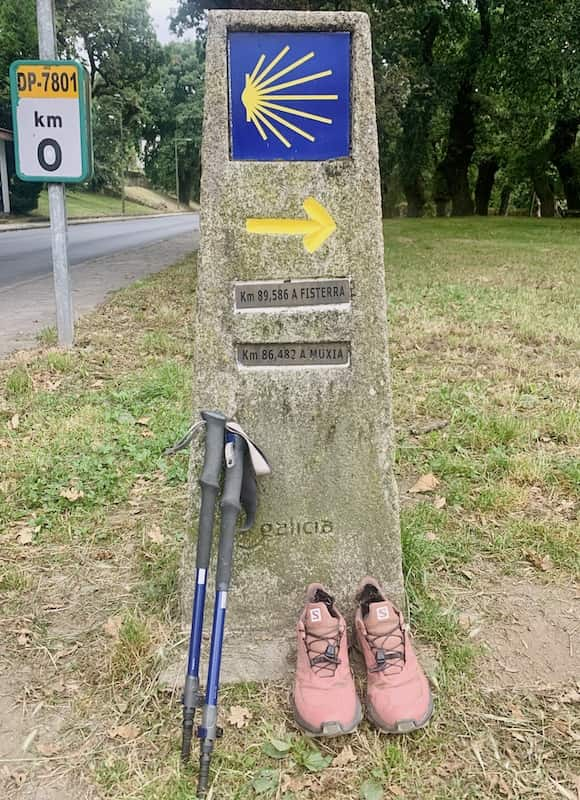
Camino de Santiago a Fisterra is marked with the traditional yellow arrows of Camino de Santiago.
Camino de Santiago a Fisterra trail is well-marked leaving no concerns to get lost.
CAMINO DE SANTIAGO A FINISTERRE STAGES
Camino de Santiago a Finisterre official stages (Santiago Fisterre etapas)
| Stages | Starting point | Finishing point | Distance (mi) | Distance (km) | Duration (hours) | Difficulty (1 – very easy … 6 – very difficult) |
| Stage 1 | Santiago de Compostela | Negreira | 12 mi | 20.6 km | 5h 15min | Easy (2 out of 5) |
| Stage 2 | Negreira | Olveiroa | 20 mi | 33.6 km | 8h 30min | Difficult (4 out of 5) |
| Stage 3 | Olveiroa | Corcubión | 13.5 mi | 21.4 km | 5h 30min | Easy (2 out of 5) |
| Stage 4 | Corcubión | Fisterra | 6.1 mi | 10.8 km | 2h 45 min | Very easy (1 out of 5) |
| Stage 5 | Fisterra | Finisterre Lighthouse | 1.2 mi | 3.2 km | 45 min | Very easy (1 out of 5) |
Above are the official stages of Camino de Santiago a Finisterre. As you can see there are 5 of them, but the final stage takes only 1.2 mi (3.2 km) from the port of Finisterre (the town’s center) to Finisterre Lighthouse.
These 5 stages of Camino Finisterre are usually walked in 4 days.
But, I hiked Camino de Santiago a Finisterre in 3 days.
And, here are the Camino de Santiago Finisterre stages I did:
From Santiago de Compostela to Fisterra in 3 days
| Stages | Starting point | Finishing point | Distance (mi) | Distance (km) | Duration (hours) | Difficulty (1 – very easy … 6 – very difficult) |
| Stage 1 | Santiago de Compostela | Negreira | 13 mi | 21.1 km | 5h 15min | Easy (2 out of 5) |
| Stage 2 | Negreira | Olveiroa | 21 mi | 34.1 km | 8h 30min | Difficult (4 out of 5) |
| Stage 3 | Olveiroa | Fisterra (Finisterre Lighthouse) | 20 mi (22 mi) | 32.3 km (35.6 km) | 8h 15min (9 h) | Very Easy to Easy (1-2 out of 5) |
As you can see, I hiked from Olveiroa straight forward to Finisterre on the third day. I checked-in in the Albergue in Finisterre and later in the same day continued to Finisterre Lighthouse (Cape Finisterre).
CAMINO DE SANTIAGO A FISTERRA: ITINERARY AND HIGHLIGHTS
Camino de Santiago a Fisterra route goes through beautiful forests, intact nature, sleepy villages, lovely pastureland to sandy beaches, and awe-inspiring sea cliffs.
Day 1: Santiago – Negreira (21.1 km; 13 mi)
The route: Santiago de Compostela – Quintans (7 km) – Alto do Vento (9 km) – Ventosa (10 km) – Transmonte (15 km) – Ponte Maceira (17.1 km) – Negreira (21.1 km)
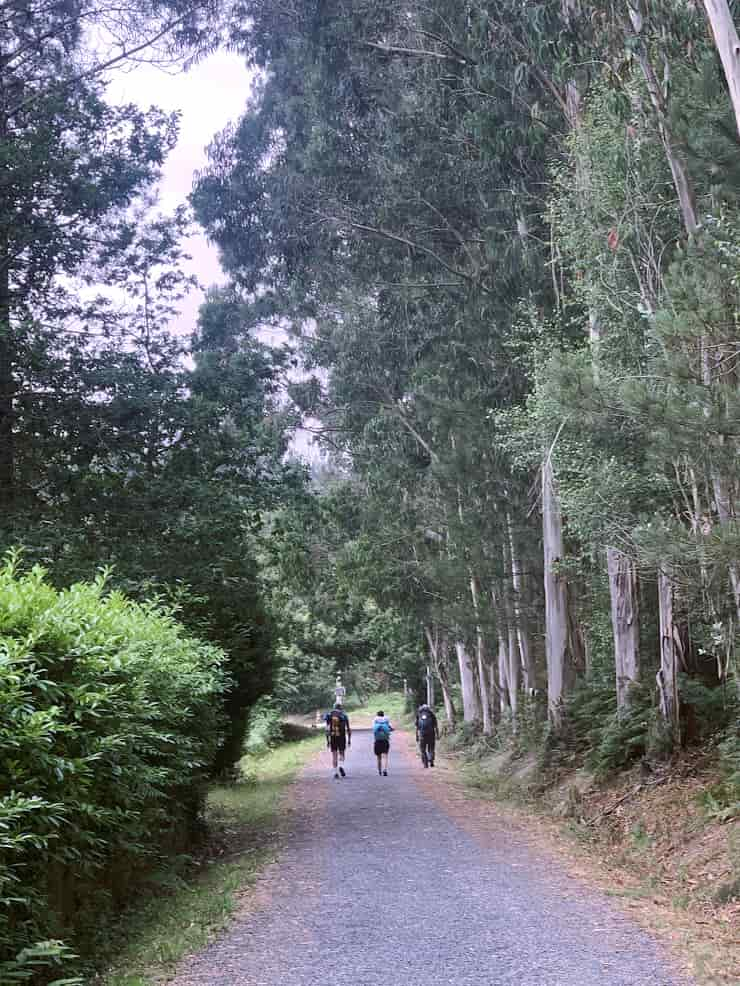
The first day takes you among hilly landscapes with eucalyptus and pine trees. This forested route is one of the most beautiful stages of the Camino.
And, crossing the Roman Bridge over the River Tambre in Ponte Maceira (just before Negreira) is one of the loveliest moments of the Camino.
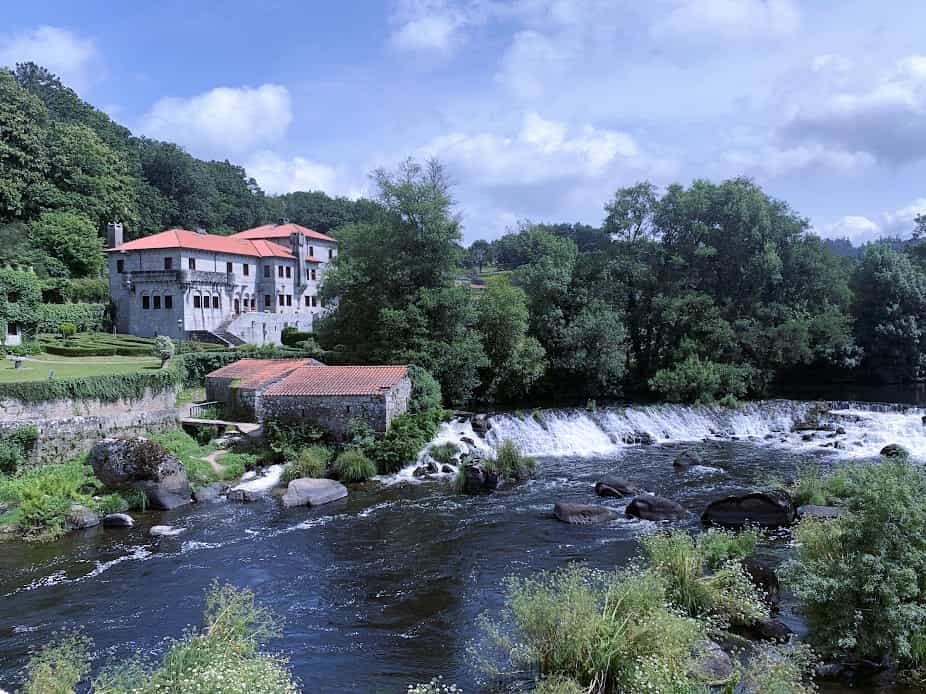
Day 2: Negreira – Olveiroa (34.1 km; 21 mi)
The route: Negreira – Zais (3.1 km) – A Pena (9.1 km) – Vilaserio (12.9 km) – O Cornado (15 km) – As Moronas (19.9 km) – Santa Marina (21 km) – A Gueima (23.9 km) – Lago (27.8 km) – Abeleiroas (28.7 km) – Corzon (31 km) – Ponte Olveira (32.5 km) – Olveiroa (34.1 km)
The second day of the hike offers as appealing landscapes as the first day. The route takes you through the oak and chestnut groves and picturesque villages, and the medieval village of Olveiroa marks the end of the second stage. Pity I had rain of Biblical proportions along the entire route on the second day.
Day 3: Olveiroa – Cabo Fisterra (35.6 km; 22 mi)
The route: Olveiroa – O Logoso (3.7 km) – Hospital ( 5.1 km) – cee (19.5 km) – Corcubion (21.9 km) – A amarela (23.8 km) – Playa de Estorde (25.3 km) – Sardineiro de Abaixo (25.9 km) – Fisterra (32.3 km) – Cabo Fisterra (35.6 km)
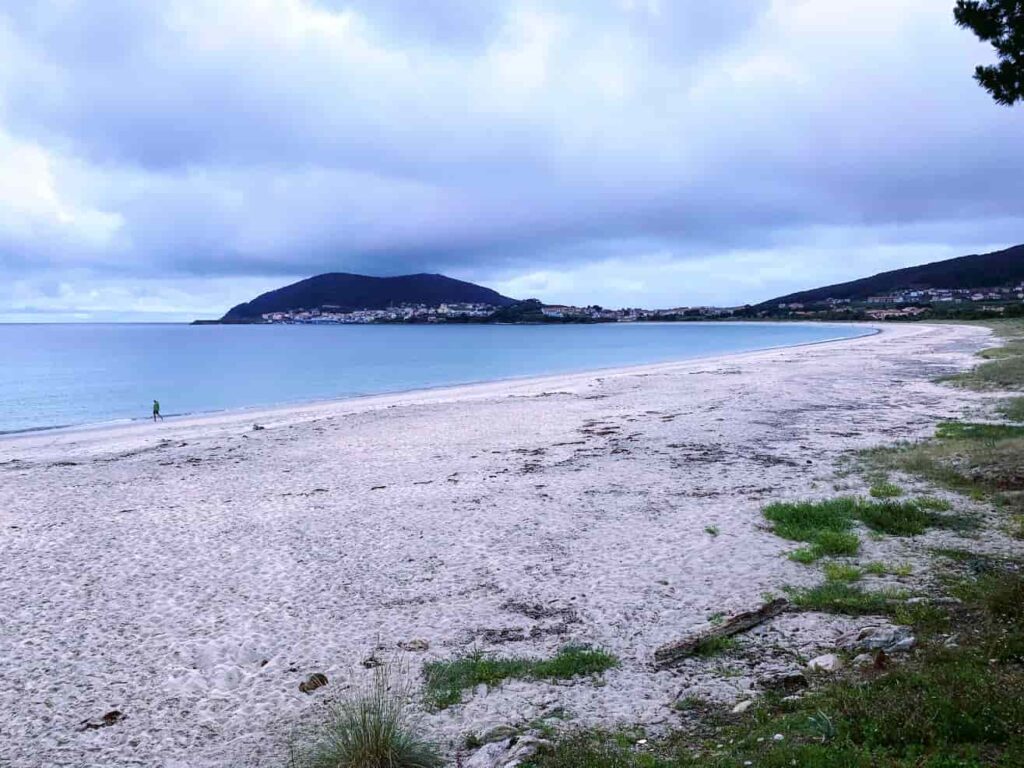
The valley of the river Xallas and the Castrelo reservoir on the second day are beautiful.
But the cliffs and beaches of Costa da Morte are the absolute highlights of the Fisterra Camino. The town of Cee with its La Concha beach is a great place to enjoy the sea. The same goes for the Playa de Langosteira in Fisterra.
But, the sunset from the Finisterre Lighthouse offers some of the most magical moments of the Camino and the spectacular ending of the Camino.
CAMINO DE SANTIAGO A FINISTERRE ALBERGUES
Stage | Place (village -town) to sleep | Recommended albergue | Recommended hotel |
| Stage 1 (Santiago -Negreira) | Negreira | Negrerira Pilgram Hostel (price €8) | Casa Néboa (Booking.com) |
| Stage 2 (Negreira – Olveiroa) | Olveiroa | Olveiroa Pilgrim Hostel (price €8) | Manola House Hostel (Booking.com) |
| Stage 3 (Olveiroa – Corcubión) | Corcubión | Albergue de peregrinos San Roque (donation; email info@amigosdelcamino.com | MarViva Guesthouse (Booking.com) |
| Stage 4 (Corcubión – Fisterra) | Fisterra | Albergue de peregrinos de Fisterra (price €8) | Hotel VIDA Finisterre Center (Booking.com) |
WHERE TO GET CAMINO DE SANTIAGO A FINISTERRE CREDENTIAL
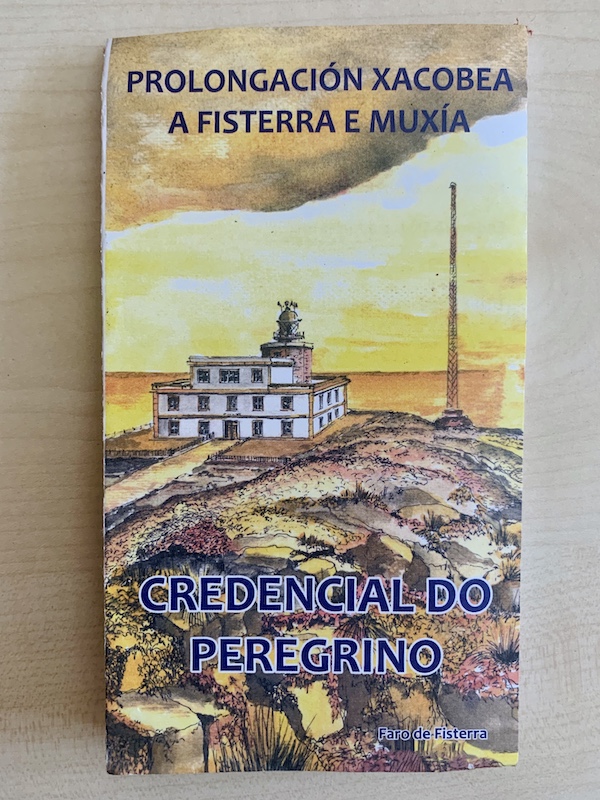
You can get your Camino de Santiago a Finisterre Pilgrim’s Credential (Credencial del Peregrino – a pilgrim’s passport) in Albergue (pilgrim hostel) in Negreira on the first day of the Camino.
Camino de Santiago a Finisterre Pilgrim’s Credential is free.
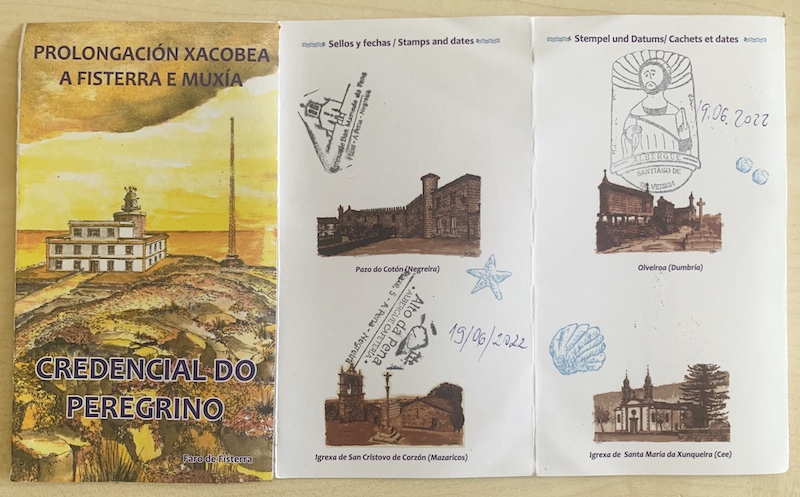
Camino de Santiago a Finisterre Pilgrim’s Credential is a pilgrim passport that documents the dates and places visited on the Camino de Santiago a Finisterre route. The sealed stamps (with the dates and places)collected in the passport serve as proof of your pilgrimage journey.
A pilgrim needs to have a stamp for each stage (day) of their Camino.
Pilgrims can seal their credentials in accommodations, bars, restaurants, churches, and tourist offices along the route.
Even if you don’t get the official Camino a Finisterre pilgrim’s credential, you can use the Camino de Santiago credential used earlier on the journey to Santiago.
HOW IS CALLED THE CERTIFICATE OF CAMINO A FINISTERRE
Fisterrana is the official certificate of the Camino de Santiago a Fisterra.
Fisterrana was created by the Fisterra Town Council in 1977.

WHERE TO GET FISTERRANA
Fisterrana is issued in the Municipal Albergue in Finisterre upon presenting the Pilgram’s Credential with the sealed stamps that prove the pilgrimage.
To get the Fisterrana certificate you need to walk, go by bike, or by horse Camino de Santiago a Fisterra. Only pilgrims who walk, or ride a bike or horse are considered to be pilgrims (peregrinos in Spanish) and are qualified to get Fisterrana.
WHAT IS THE BEST TIME TO DO CAMINO FINISTERRE
The best time to hike Camino Finisterre is from March to November for the pleasant temperatures and lesser rainfall.
Galicia with its rainy Oceanic climate is one of the coldest regions in Spain.
Winter in Galicia is wet and the summers are mild because of the influence of the Atlantic ocean.
The most popular months to hike Camino de Finisterre are April, May, June, September, and October.
I hiked Camino a Fisterra in mid-June and I had 2 days of rain out of 3 days. The expression ‘prepare for rain and pray for sun’ seems as if it was made in Galicia. So, prepare to have rain in Galicia regardless of the month you hike Camino Fisterra and Galicia in general.
CAMINO FINISTERRE MAP

During my Via de la Plata hike I heard about Camino Ninja App from the perigrinos for the first time. To tell the truth, all pilgrims along the route were using the app.
One day, I decided to try the Camino Ninja App, and I downloaded the app.
Camino Ninja App is a free mobile phone app with offline GPS tracker maps of various Camino routes. It tracks your steps along the route, so you can check whether you are on the correct path at any moment.
Camino Ninja App offers not only maps but also info on accommodations along, with available bars, restaurants, groceries, … and even info on the elevation of the stages. This app is a great tool for planning the Caminos.
I used Camino Ninja App on Camino de Santiago Via de la Plata and Camino de Fisterra, and I can highly recommend the app as a valuable resource for hiking the Caminos.
WHAT TO PACK FOR CAMINO DE FISTERRA
I hiked Camino del Norte, Via de la Plata, and Santiago Fisterra with the same items. I am a light traveler who enjoys minimalism and who recommends ultralight Camino packing.
Honestly, there’s no need to pack anything else but necessary items. You can always buy something if needed as you walk through the villages, towns, and cities along the Caminos.
Please do yourself a favor and don’t overpack.
Read my ultimate Camino de Santiago packing list!
VISITING FISTERRA BY A DAY TOUR OR BY BUS
Some people decide just to visit Fisterra (mostly for the lack of time) and not to hike the Camino de Santiago a Fisterra.
As such, they don’t qualify for getting Fisterrana. Nevertheless, visiting Fisterra is a unique experience that should not be missed out.
Day tours from Santiago to Fisterra and daily buses from Santiago to Fisterra are available.
A day tour from Santiago to Fisterra usually includes a visit to Muxia too and the tour lasts about 9 hours. Check out: Santiago de Compostela: Finisterre, Muxia & Costa da Morte
Santiago to Finisterre bus
Several daily buses run directly from Santiago to Fisterra. Santiago – Fisterra buses are operated by MonBus .
Buses from Santiago to Fisterra run every 4 hours daily. A bus ride from Santiago to Fisterra takes 2 or 3 hours (depending on the bus itinerary stops), and it costs from €8 to €11.
However, a bus ride from Fisterra to Santiago takes only 1 hour. The bus station in Fisterra is in front of the municipal albergue de peregrinos in Fisterra.
Check out schedules and tickets: MonBus
Alternatively, you can take a taxi, or hire a car in Santiago and visit Fisterra.

